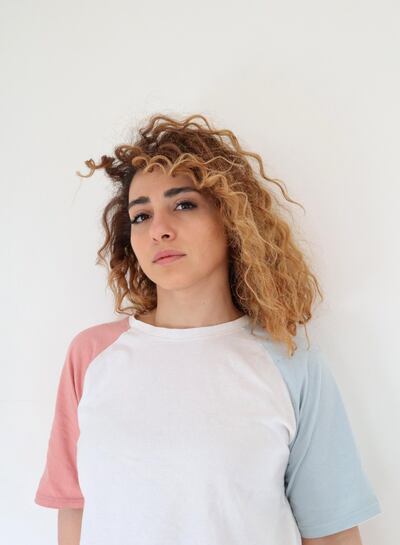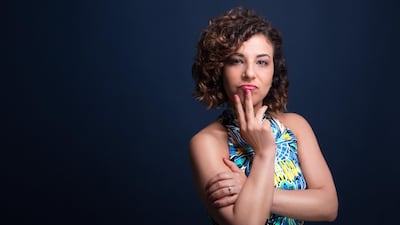It was only the seed of an idea, but Aser El Saqqa ran with it. Soon after the Arab uprisings, the founder of Arts Canteen, an organisation that supports emerging artists from the Arab world, realised that despite a renewed mainstream interest in Arab culture, there was very little celebration of its female talent. "I wanted to shed a light, open doors – and windows," says El Saqqa. But even he can't quite believe what has happened since.
From a one-day event in 2015, London's Arab Women Artists Now festival (Awan) has grown to a three-week extravaganza of film, visual arts, performance, music, comedy and literature. "It feels like a very significant moment," says El Saqqa ahead of the sixth iteration, which will kick off this weekend. "There's such huge appetite for this festival now, and we've carved a name for Arab artists while becoming a platform for better understanding. I'm very excited."
The Arabs Are Not Funny comedy night on Friday, March 13, is a classic example of the breadth, scope and ambition of Awan. Beginning as an Arts Canteen-promoted night just before the first festival – with an entirely male bill – it's gone on to be a regular show in its own right that has sold out spaces in London's Royal Albert Hall as well as Dubai Opera. Headlining a special show this year is rising Egyptian-American comic Maria Shehata – who also performed at the Dubai date in 2018 – and she can't wait to be a part of it again.
“The whole Arabs Are Not Funny idea is based on this misconception that we’re somehow really angry people,” she says. “When I first performed to Arab audiences, I spent the entire time visualising my aunts and uncles in the front row, tutting that this nice young lady was being so rude! But actually, you find nearly every audience is full of young, cosmopolitan people who love to hear me talking about relationships, sexuality and what it’s like to be an Arab woman.”
Shehata's hilarious (and aptly named) Frank podcast with Olivia Lee, which has recently finished its second well-received season, deals in disarming, brutally honest comedy. Her breakthrough show at Edinburgh Festival Fringe was, somehow, a peppy hour about her engagement falling apart – and she still gets people coming up to her after a show to ask what her relationships are really like. She giggles. "I'm like, 'I dunno, I just told you exactly how it was.' I think comedy allows you to say things that you couldn't normally say, and maybe give insight into people and situations that might otherwise be off limits."
El Saqqa agrees – not least because one of the original intentions of Arabs Are Not Funny was to break down stereotypes and bring Arab comedians to a safe place where hot topics could be tackled in a funny way. It has become one of the bestselling comedy nights in the Arab community in London (they also sold a staggering 1,400 tickets in Dubai for a night), but El Saqqa is keen to point out that 60 per cent of the audience are non-Arabs.
"Culture and comedy is the way you break down barriers, absolutely," he says. "Look at the line-up at Awan – Maria is Egyptian-American, we have British-Lebanese actress, comedian and writer Isabelle Farah, Tunisian-Swiss comic Leila Ladari, Belgian-Tunisian [comedienne] Serine Ayari and many more. Just an incredible, insightful mixture of people and backgrounds who are all part of our culture. The Arab world is so diverse – and we try and cover as much as we can."
And that celebration of the Arab diaspora is shot through another performance piece at Awan. Areej Kaoud is a Palestinian who was born in the UAE and has lived in Montreal, Dubai and now London. Her show this weekend, Dates, is a storytelling and song piece about her family's love for this fruit, which is so symbolic to the Arab world. If that sounds slightly odd, Kaoud can explain.
"My family are involved in the dates business in Jericho – we import and export, we have land and we grow the palm trees so there is this love for this fruit," she says. "And when I was growing up, there was this old tune sung by Naima El-Masreya [Naima the Egyptian] called Dates, which we always used to sing at family gatherings. So in the show, I share how much this fruit plays a role in how I have arrived here today, and then I end by singing the song."

So Dates is bound up in identity, like so much of the Awan programme, which also includes a Sudanese and Afro-Arab design exhibition by artist Rayan El Nayal, music from Swedish folk and world band Tarraband and Moroccan star Oum, as well as film and literature strands. As a Palestinian, Kaoud has always felt a sense of uprootedness – even when she was looking at palm trees in Sharjah – and after a conversation with El Saqqa, she began to develop Dates. In fact, she even sung the song to him over dinner.
“I had a lot of anxiety growing up and this song helped me gain confidence; first by singing along to myself, then by joining in and finally singing on my own. It took me from complete silence to saying something about myself and confronting an audience. It’s interesting; I’m actually a contemporary artist, so directly addressing and sharing myself with an audience is something completely new for me. “I’m nervous … and excited.”
As is El Saqqa. His passion for making Awan a rich and varied festival has a by-product, he hopes, in helping expose budding directors, actors, dancers, musicians, artists and writers to the wider cultural industries. He was so sure of Awan's potential for good that when funding became an issue last year, they found a way to keep the festival going. This year, thankfully, that's not a problem.
“We are humble, but we have a very big ambition,” he says. “Hopefully we can have an open call for submissions in the future, and yes, it would be great if Awan 2021 could be an independent body or charity led by women, and not by me.
“Maybe one day, Awan could work in other cities across the world, too. But for now, I’m so proud of these women artists.”
Arab Women Artists Now runs from March 5 to Sunday, March 29 at various venues across London. More information is at www.awan.org.uk

